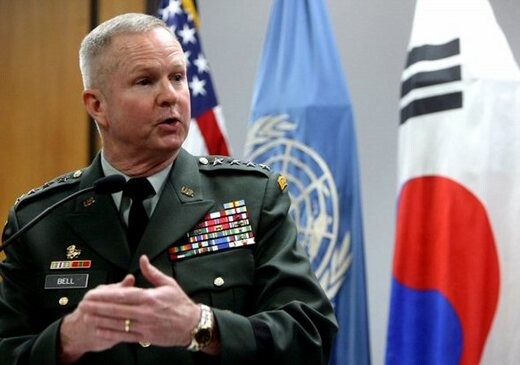hankyoreh
Links to other country sites 다른 나라 사이트 링크
Head of U.S. Forces Korea calls on S.K. to up missile defense

Burwell B. Bell, the general in charge of U.S. forces in South Korea, has intensified pressure on the South Korean government to update its country’s military defense capabilities.
In a document submitted to the U.S. Senate’s Armed Services Committee on April 23, Bell made a variety of complaints and demands to the South Korean government as well as the U.S. government and Congress. Bell requested South Korea to directly make concessions regarding requests made by the U.S. regarding its defense preparations, and also asked the U.S. government and Congress to show flexibility in allocating its military budget for its units stationed in Korea.
One of the most notable demands made on the South Korean government by Bell was related to the so-called ‘Missile Defense’ system. Bell said the importance of Theater Missile Defense to protect the Korean peninsula is gaining after North Korea test-fired missiles last year.
Bell said that South Korea must buy a system that is fully compatible with the U.S. system, hinting that South Korea should buy the newest Patriot Missile models (Pac-3) that U.S. Forces Korea currently uses.
Pac-3 is a weapons system that has raised U.S. Forces Korea’s readiness by one notch, Bell said.
In addition, Bell said a continued supply of the Patriot Pac-3 system, combined with early warning systems, Aegis-equipped destroyers and high-altitude protection, would allow the U.S. forces in South Korea to have what he called a multi-level anti-missile capability in the future.
Such remarks came as South Korea is trying to build up its own anti-missile system. Currently, South Korea is pushing to buy 48 units of Patriot Pac-2 missiles from Germany starting in 2008 to replace outdated Nike missiles. Compared with the Pac-3, the Pac-2 is cheaper and reportedly has limited compatibility with the U.S.-led missile defense system.
In addition, the South Korean government has expressed its intention of not joining the U.S.-led defense system because it says such a system would be ineffective in a small region like the Korean peninsula. As South Korea has taken a guarded position toward joining the U.S.-led missile defense system, Bell’s remarks could be considered a strong demand for Seoul to purchase the U.S.-based Pac-3 system.
Bell also commented on the possibility of a review of U.S. base relocations in South Korea, as well as asking South Korea to increase its payment to the U.S. for maintaining troops in Korea, while at the same time asking the U.S. government and Congress to allot more money to U.S. Forces Korea.
The remarks are likely to see backlash from South Korean officials who have complained about the breakdown of defense cost sharing for U.S. Forces Korea, as well as how the budget is allocated.
Responding to Bell’s remarks, South Korean Foreign Minister Song Min-soon said, "We have proposed that the U.S. discuss with us ways to share the defense cost in a more rational, transparent, and responsible way. It’s time for the U.S. to answer." Song’s response was understood as referring to a controversial cost-sharing scheme for the U.S. Forces Korea, which has been criticized for allegedly allowing the U.S. to one-sidedly decide how to spend the budget, according to some analysts.
There are currently 29,000 U.S. troops stationed in South Korea, as the 1950-53 Korean War ended with an armistice, rather than a peace treaty.
Please direct questions or comments to [englishhani@hani.co.kr]
Editorial・opinion
![[Editorial] Yoon must halt procurement of SM-3 interceptor missiles [Editorial] Yoon must halt procurement of SM-3 interceptor missiles](https://flexible.img.hani.co.kr/flexible/normal/500/300/imgdb/child/2024/0501/17145495551605_1717145495195344.jpg) [Editorial] Yoon must halt procurement of SM-3 interceptor missiles
[Editorial] Yoon must halt procurement of SM-3 interceptor missiles![[Guest essay] Maybe Korea’s rapid population decline is an opportunity, not a crisis [Guest essay] Maybe Korea’s rapid population decline is an opportunity, not a crisis](https://flexible.img.hani.co.kr/flexible/normal/500/300/imgdb/original/2024/0430/9417144634983596.jpg) [Guest essay] Maybe Korea’s rapid population decline is an opportunity, not a crisis
[Guest essay] Maybe Korea’s rapid population decline is an opportunity, not a crisis- [Column] Can Yoon steer diplomacy with Russia, China back on track?
- [Column] Season 2 of special prosecutor probe may be coming to Korea soon
- [Column] Park Geun-hye déjà vu in Yoon Suk-yeol
- [Editorial] New weight of N. Korea’s nuclear threats makes dialogue all the more urgent
- [Guest essay] The real reason Korea’s new right wants to dub Rhee a founding father
- [Column] ‘Choson’: Is it time we start referring to N. Korea in its own terms?
- [Editorial] Japan’s rewriting of history with Korea has gone too far
- [Column] The president’s questionable capacity for dialogue
Most viewed articles
- 1Months and months of overdue wages are pushing migrant workers in Korea into debt
- 2At heart of West’s handwringing over Chinese ‘overcapacity,’ a battle to lead key future industries
- 3Seoul getting its first-ever vertical farm
- 4Fruitless Yoon-Lee summit inflames partisan tensions in Korea
- 5Trump asks why US would defend Korea, hints at hiking Seoul’s defense cost burden
- 6[Editorial] Yoon must halt procurement of SM-3 interceptor missiles
- 7[Editorial] New weight of N. Korea’s nuclear threats makes dialogue all the more urgent
- 8Dermatology, plastic surgery drove record medical tourism to Korea in 2023
- 9Under conservative chief, Korea’s TRC brands teenage wartime massacre victims as traitors
- 10Gangnam murderer says he killed “because women have always ignored me”